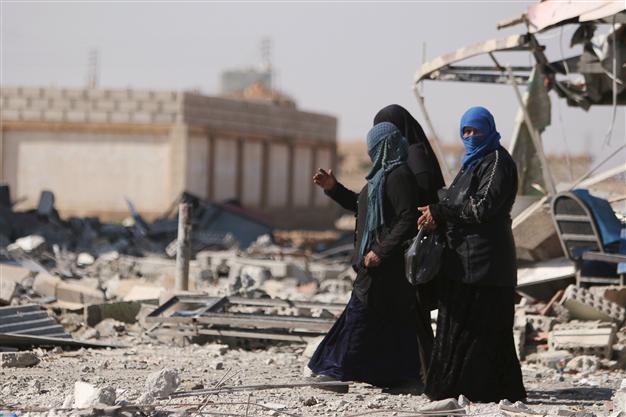Turkish jets patrol border as Syria cease-fire largely holds
Uğur Ergan ANKARA

Women walk on rubble in al-Shadadi town, in Hasaka province, Syria. REUTERS photo
Turkey was on Feb. 27 closely following a landmark U.N.-backed cease-fire in Syria that came into effect at midnight in the war-torn country.
Turkish Air Force F-16s continuously patrol the Turkish-Syrian border with the cease-fire largely holding amid reports of some minor clashes and attacks.
The number of Turkish jets patrolling the border have been increased to 14, the biggest number in recent months except Nov. 25, 2105. One day after Turkey shot down a Russian warplane for violating its airspace, 18 Turkish F-16s were on patrol along the border.
The General Staff also said three boats and a mobile radar are being used to control the sea line bwteeen Hatay and Syria’s Latakia.
A rare calm prevailed across much of Syria on Feb. 27 as the first major cease-fire of the five-year war took hold and an international task force prepared to begin monitoring the landmark truce.
Guns fell silent at midnight in suburbs around the capital and the bomb-scarred northern city of Aleppo, AFP correspondents said, after a day of intense Russian air strikes on rebel bastions.
The nationwide cessation of hostilities, brokered by Washington and Moscow, is seen as a crucial but fragile step towards ending a war that has claimed 270,000 lives and displaced more than half the population.
It faces formidable challenges including the exclusion of the Islamic State of Iraq and the Levant (ISIL) and al-Qaeda's Syria affiliate al-Nusra Front which control large parts of the country.
ISIL, meanwhile, attacked the town of Tel Abyad controlled by the Syrian Kurdish Democratic Union Party (PYD) at the Turkish border as well as the nearby town of Suluk on Feb. 27, a spokesman for the People’s Protection Units (YPG) -- the armed wing of the PYD -- and Turkish security sources told Reuters.
The YPG and Syrian Kurdish internal security forces were able to "crush this attack and encircle the attackers," YPG’s Redur Xelil said. "The attackers were eliminated," he added. He gave no casualty toll.
The YPG, which Turkey considers a terrorist group for its links to the outlawed Kurdistan Workers' Party (PKK), captured Tel Abyad from ISIL last year in an offensive backed by U.S.-led air strikes.
The Turkish security sources said the attack was launched in the early hours of Feb. 27 on two fronts and that the sound of gunfire and explosions, audible from the town of Akçakale on the Turkish side, had continued for several hours.
The security sources and a witness in Akcçkale said war planes thought to be from the U.S.-led coalition against ISIL struck the jihadist positions and that the Turkish army had increased patrols on its side of the border.
Several rebel groups in the western and northern part of the country said early on Feb. 27 that it was mainly quiet so far.
Nevertheless, Fares Bayoush, head of the Fursan al-Haqq rebel group which fights under the banner of the Free Syrian Army, told Reuters that continuing violations could lead to the "collapse of the agreement."
"There are areas where the bombardment has stopped but there are areas where there are violations by the regime such as Kafr Zeita in Hama, via targeting with artillery, and likewise in Morek in northern Hama countryside."
In early reports of violence, a Syrian rebel group in the northwest said three of its fighters had been killed while repelling an attack from government ground forces a few hours after the plan came into effect. Its spokesman called it a breach of the agreement.
Syria's state media said at least two people were killed and several wounded when a car bomb exploded at the entrance of Salamiya, a town east of Hama city and a frontline between government forces and ISIL, which later claimed responsibility for the attack.
